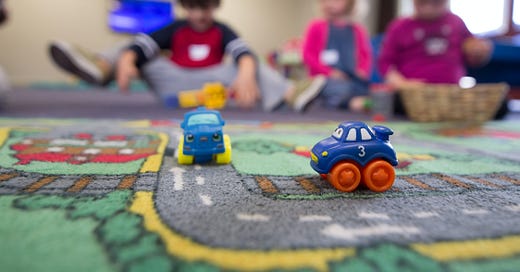Rich Parents Know Preschool is Valuable
Affluent parents don't need studies to prove that young children benefit from high quality early education programs
One of my favorite weekly features on the NYT is The Conversation where Gail Collins debates the issues of the day with various right-leaning columnists, most recently Bret Stephens. In a recent edition they discussed a new report on 4th grade reading proficiency. They both agreed additionally testing is not the answer. Collins believes the answer is more funding for early childhood education. She specifically says “Let’s focus on early childhood education — if it’s the right quality, kids will move on to grade school with skills in problem solving and critical thinking that make the next level so much easier. That, of course, would require a lot more money.”
Stephens, unsurprisingly, dismisses this idea in favor of a return to phonics. And parents reading to their children. But it’s what he says about the notion of a need for additional funding that struck me. He writes: “I’m pretty sure the United States spends much more per student than most other countries, only to achieve lackluster results.”
Is he pretty sure? Because I’m pretty sure he’s wrong.
Now here’s the thing about school funding. You can slice and dice that data in roughly 1,000 different ways to make whatever point you want to make. I’m not going to fall down the rabbit hole of trying to prove him wrong. But it’s important to note that Collins was specifically calling out early childhood education, whereas he then pivots to “the US spends much more per student,” suggesting he’s possibly talking more broadly about public spending on education.
Again, I’m not going to try and prove him wrong on overall spending. But it is fairly well and recently documented that the US spends much less than any other peer nation on early childhood, especially very early childhood, education. The reason for this is simple: “early childhood education” is, to many people, a code word for “childcare.” Of course when you are talking about toddlers the line between care and education is very blurry. A school-based program must, by sheer necessity, also provide care. And since toddlers are learning every waking minute of their day, any caregiver they have is providing education – intentionally or not.
Those who oppose expanded public financing of early childhood education point to studies showing it’s ineffective. That is the point Stephens is making – we already spend a lot and look at what we get for it! But of course we don’t spend a lot on preschool, and what we do spend goes to the poorest children. Which makes it hard to study these programs for effectiveness in a way that controls for the myriad other factors that influence the academic performance of poor children. Under the best of circumstances these studies are hard to do and easy to manipulate.
Of course I find that studies aren’t a reliable way to assess the value of things like preschool. A better way is to look and see what rich parents do. Rich parents send their kids to preschool programs. In fact they fight to get their children into the “best” preschool programs. And that is for a very simple reason: preschool prepares kids for school. It gives them early skills that lead to better performance later on.
I get why many people don’t want to spend money on public education. It’s expensive. It’s labor intensive (even more true for the youngest kids). But let’s stop pretending that opposing education spending is a principled position that is based on the idea that more spending doesn’t lead to better outcomes. The many children whose parents can’t afford preschool would absolutely benefit from having access to these programs. The only proof you need is to look and see what their more affluent peers are doing.





